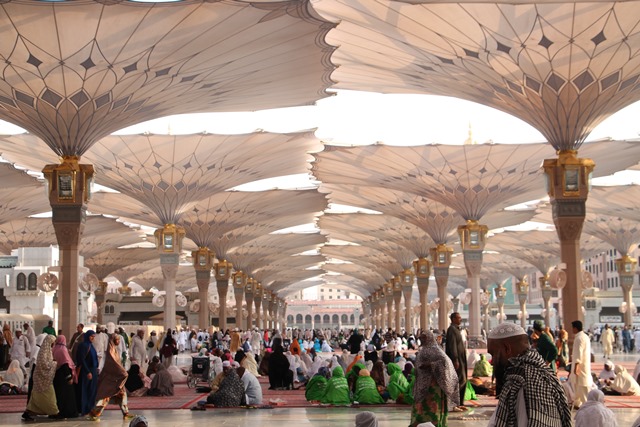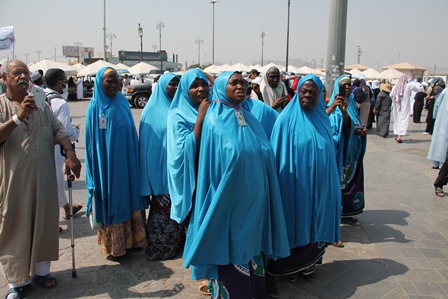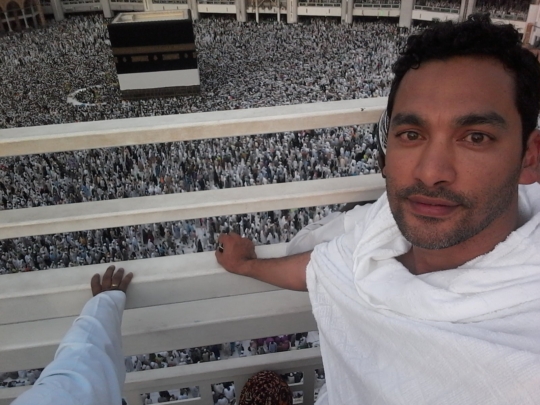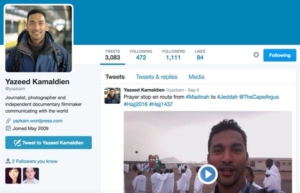Covering the Hajj, from the holy lands

South Africa based journalist Yazeed Kamaldien is reporting on the Hajj, traveling to Madinah and Makkah in Saudi Arabia to follow the route of millions of Muslim pilgrims from around the world.
In order to help journalists who are planning to cover this major religious event this year or in the future, Yazeed Kamaldien shared with the IARJ some tips from Madinah where he is currently preparing to travel to Makkah.
We share his advices with our readers and religion journalists to help them make the best of their Hajj coverage.
For Muslims only
The first thing and most important thing that one can start with is the fact that in Islam Sharia (Islamic law), the two holy cities of Islam can be entered by Muslims only, so journalists from other faiths cannot cover Hajj events from the ground.
Between coverage and worship
If you are going to cover Hajj for your organization or as a freelancer, make time for the worship rituals and the writing. It can be very overwhelming as it takes time to get through crowds of people while doing your reporting. It is not easy to perform the Hajj and follow the story as a journalist, unless you are writing personal feature or opinion pieces which you can file for your organization later. If you need to produce stories and photos every day, then you will find this really difficult as you would need to make the time for it all.
On another note, there can be so many stories. You have to spend time talking to people. But not everybody has the time though and pilgrims are mostly moving between three cities: Jeddah, Madinah and Makkah, in the lead-up to the five days of Hajj. It’s best to do most of your stories before the principle days of Hajj. During these days of Hajj, there may be no time to interview pilgrims. You would then focus more on the events on the day, reflecting on the atmosphere and crowds as they move between sites where the Hajj rituals are performed.
Hajj on social media
Social media makes it a lot more fun to report on Hajj. You can post pictures and videos as well as your personal thoughts that you won’t necessarily use for an article. I found through social media posts that three people I know are also coming to perform the Hajj. One I met when I lived in Yemen and the other in Accra at the IARJ’s conference on journalism and religion in Africa. A third is a someone that I knew from the neighborhood I grew up in as a child.
Harsh weather
It is very hot and temperatures go up to mid 40 degrees Celsius during Hajj in 2016. Even the evenings are warm. Pack rehydration salts if you are not used to this heat. This will help you stay healthy. Also pack extra vitamins to stay healthy in a crowded environment where some people may cough and sneeze around you, spreading bacteria. Take care of your health. It’s vital if you are to report on this story which lasts for at least five days and more.
Stampedes and crowdedness
It’s pointless trying to fight your way against a crowd. You will only frustrate yourself and waste a lot of time. You have to go around the crowd or, as they say, go with the flow. Pack a fair amount of patience in your travel bag. This story is physically demanding. You have to stay on top of your game and make sure you give yourself enough time to get to places, such as the mosques and sites of interests. Also it’s best not to rush from one place to the next, especially if you are here for personal spiritual growth too. Give yourself time to absorb each place you visit. Appreciate and savour this amazing journey.
Talking to women

Men and women prayer areas are separated in Madinah but not so in Makkah. In an area where Islamic ethics are followed this should be respected. Not all women want a strange man to talk to them. Maybe first start a conversation with a man who is with women if you want to interview women. Then ask if you can interview the women. Going directly to the women if you are a man could be seen as disrespectful and bothersome, and vice versa. Quite a few women would do interviews though. There are people who are very relaxed and open to meeting others. Many pilgrims, or Hajjis, seem very interested in meeting other people from around the world. Start your sentence with the universal greeting Asalamu alaykum and then find out what language you can communicate in. One of the pleasures of Hajj is meeting from around the world. Just be conscious of Islamic ethics.
Photography

Mostly feel free to take photos but do not do so if the persons make it clear from the beginning. Some good pictures can come from pilgrims being prepared for instead of feeling like your camera is interfering with them. Of course you will take a few snaps to make sure it’s not all posed. That’s to avoid some of the funny looks you get from pilgrims who don’t want their photos taken. It is polite anywhere to ask but not essential, especially in crowds. I have asked some if I can take photos with them and they said yes. Some also said no. Mostly I have had no problems taking photos of people on Hajj. So many people have their mobile phone cameras with them and are taking pictures all the time in the mosques. It is also a good idea to make sure you have a decent phone camera or a small compact camera as big cameras will not be allowed inside the mosque areas. I have been warned that security inside the mosques would take away my SLR cameras if I take it with me into the mosques.
Internet connection
It is best to bring a Wi-Fi router or some form of wireless communication. You can buy a local SIM card and get data credit for it in Saudi Arabia. That worked best for me. You can still also use WhatsApp on your phone if you buy data and of course you can also make phone calls. It is better to have your own laptop and wireless options which you can buy a SIM card for in Saudi Arabia and load with credit. You will need your passport to get a local SIM card.

Transportation
If you are traveling on your own and do not speak Arabic, transportation can be difficult and expensive. As you are in a new city, you could spend a lot of time finding your way. A way around this is using taxis but this will be costly. Taxis are expensive in this ‘tourist season’. There are local buses but their routes will take time to learn. Using a taxi could be your best bet but it’s a bit expensive. Traveling in a Hajj group of course makes it easier but make sure you are guided to all the historical sites of importance too, to get the bigger story about Islam and Prophet Muhammad, especially in Madinah which the prophet loved so much.
Follow Yazeed Kamaldien’s tweets via @yazkam on Twitter
You can also find him on Instagram: @yazkam
Yazeed Kamaldien is a journalist, photographer and independent documentary filmmaker from Cape Town, South Africa. He is a co-founder and a board member of the International Association for Religion Journalists. He has worked in various countries, on assignment in Syria, the Gaza Strip, Yemen, Sudan, Brazil and others. His work has a socio-political slant and his focus on religion has been consistent.
